Traditional Chinese wedding customs
中国的传统婚礼习俗
Traditional Chinese wedding customs
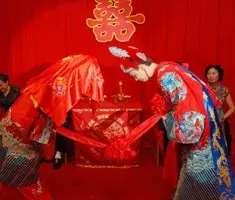
Chinese traditional wedding customs are derived from thousands of years of Cultural accumulation in China. Chinese people prefer red, believing that red is a symbol of auspiciousness and joy. Therefore, Chinese traditional weddings always use bright red to set off a festive and warm atmosphere. Filial piety, blessing and auspiciousness have become the main themes of the wedding, and almost every ceremony of the wedding is permeated with Chinese philosophy.
Let's take a look at traditional Chinese wedding customs.
三书
Three letters
According to traditional Chinese etiquette, "three letters" refer to the documents exchanged during the process of betrothal. They are "letters of engagement" -- letters of engagement exchanged at engagement; "Gift letter" -- a list of gifts, detailing the types and quantities of gifts; "meet letter" -- the book to welcome the bride, used when picking up the bride on the wedding day.
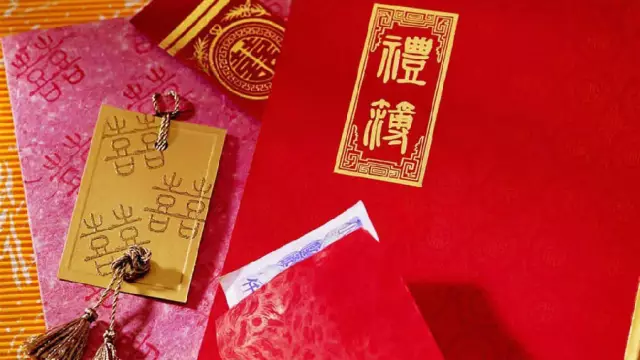
六礼
Six etiquette
It refers to the procedures of marriage and marriage. Respectively for 纳采 "Nacai" -- commonly known as matchmaking, that is, the man's home to ask the matchmaker to the woman's home, the woman promised to discuss after marriage, the man's home prepared gifts to propose; 问名 "Ask a name", commonly known as 合八字 "He ba zi", asks the matchmaker to ask the date and name of the woman's birth and prepare the marriage ceremony. 纳吉 "Naji" - that is, after the man's family bodes well, prepare a gift to inform the woman's family, the marriage preliminarily agreed; 纳征 "Na Zheng"- the man selected auspicious day to the bride's house held engagement ceremony; 请期 "Qing qi"- choose auspicious day to get married, the old choice auspicious day is generally double month double day, do not like to choose three, six, November, three have scattered sound(It means dispersion). Do not choose six because do not want to newlyweds only half-life marriage, November implies bad thing meaning. "Escorting" -- on the wedding day, the man goes to the bride's house to marry her in person with a letter of greeting.
安床
An chuang
A few days before the wedding, choose a good day, in the new bed will bedding, sheets spread, and then spread on the longfeng quilt, bedding on all kinds of fruit, such as peanuts, red dates, longan, lotus seeds, meaning the couple early birth. The people who carry the bed, make the bed and scatter the fruit are all carefully selected for "good fortune person" - with living parents, siblings, a harmonious marriage and two children, it is natural to hope that such people will bring good luck to the couple.
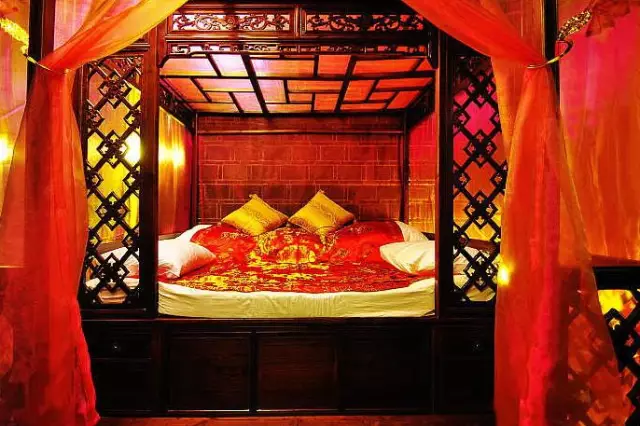
嫁妆
Dowry
The escort from the bride's family is a symbol of her family's status and wealth. The dowry was sent to the men’s house no later than the day before the wedding. In addition to clothing accessories, dowry is mainly a symbol of good omen things, such as: scissors, meaning good relationship between husband and wife;Beautiful wedding dresses, Spittoon, also known as posterity bucket; Vase, meaning 花开富贵 “flowers and riches” ; Shoes, meaning grow old together; Chi, meaning fertile fields and so on. Of course, customs and customs vary from place to place.
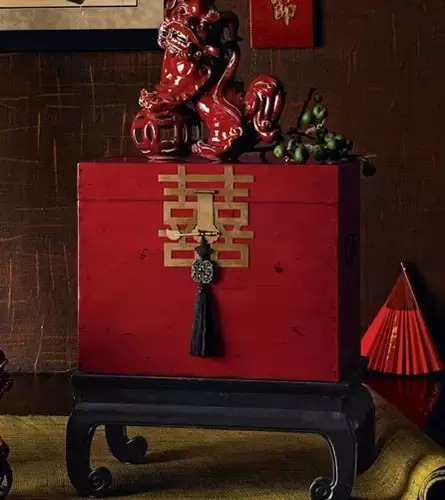
上头
Shang tou
This is a premarital ceremony for both men and women. On auspicious days, men and women in their respective homes by the local respected people to comb their hair, comb, while saying loudly: a comb to the tail, two comb to white hair eyebrows, three comb to children and grandchildren all over the ground, four comb to four silver bamboo shoots standard.
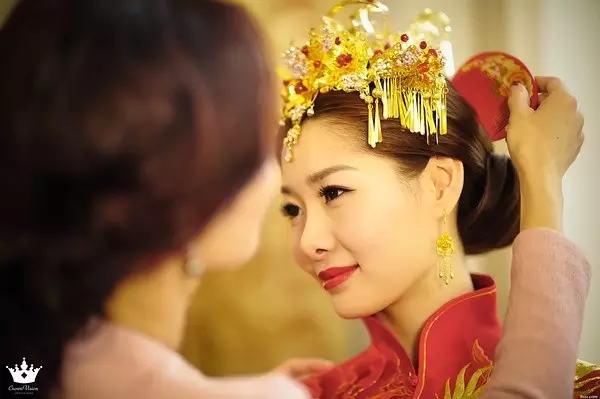
红盖头
Red curtain
The bride usually covers her head with a square red scarf with a side length of three feet. The red scarf is called 盖巾 "gai scarf", commonly known as a head covering. There are two theories about this marriage custom: one is that in ancient times the bride was covered with a red veil to cover her shame; Another expression is derived from the ancient saying "predatory marriage", meaning that the bride covered her head and could never find her way back, just like "water poured out by a married daughter", indicating the status of women in ancient times.
撑红伞
Hold umbrella
On the day of the wedding, when the bride goes out, she stands in the open air and is protected by a red umbrella held by the bride's sister or bridesmaid, which means "opening branches and scattering leaves", and sprinkles rice to the sky and the top of the umbrella.
哭嫁
Crying marriage
Crying marriage may seem hard to understand today, but in ancient times, daughters who got married had little chance to meet their family members due to inconvenient transportation. Moreover, after a woman got married, she could not go home to visit her family at any time like now, and the bride had to get the approval of her in-laws to go home. There is also a saying that the origin of crying marriage is because in ancient times, women's marriages were arranged by their parents' orders and matchmakers' words. Women did not have the right to choose freely, so they used crying marriage songs to complain about the unfair marriage system.
拜堂
Bai tang
Also known as "worship heaven and Earth", it is a very important ceremony in the traditional Chinese wedding ceremony, but worship does not belong to the ancient "three books and six rituals". In the wedding ceremony, the master of ceremonies will say loudly: "one worship heaven and earth, two worship gao Tang, husband and wife pay worship, sent into the bridal chamber." Among them, "worship heaven and earth" represents the worship of heaven and earth gods; "Worship gaotang" refers to the male parents salute, express filial piety; "Husband and wife make obeisance" means the husband and wife treat each other with respect. In a way, conjugal worship is a manifestation of one of the few ways in ancient times that women could be placed on an equal footing with men.
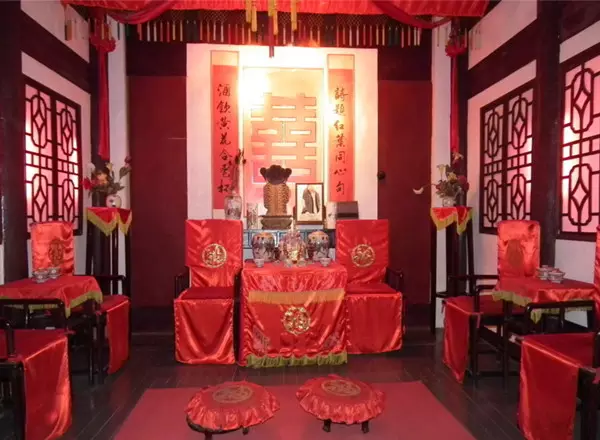
闹洞房
Nao dong fang
In the old days, the groom's brothers could play the game in the house of the newlyweds, meaning to increase happiness for the couple, and to ward off evil spirits and auspiciousness after marriage.
三朝回门
Come back in three days
Meaning "guining", the bride returns to her parents' home to report her safety. On the third day of the marriage, the bride accompanied by her husband would return to her parents' home with some gifts to worship her ancestors and then return to her husband's home. In ancient times, it was difficult for a woman to go back to her mother's home after she got married, so it was probably the last chance for a woman to visit her mother's home.
Reference: HanfuClub